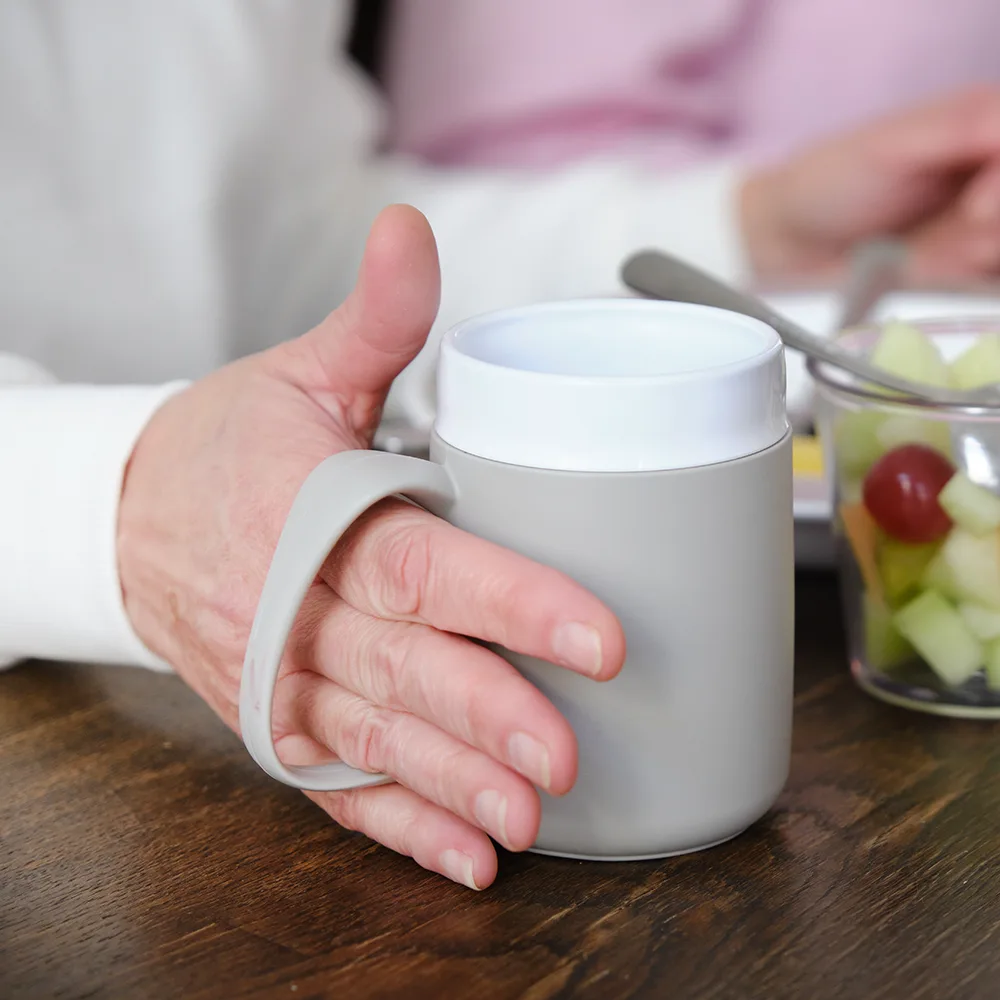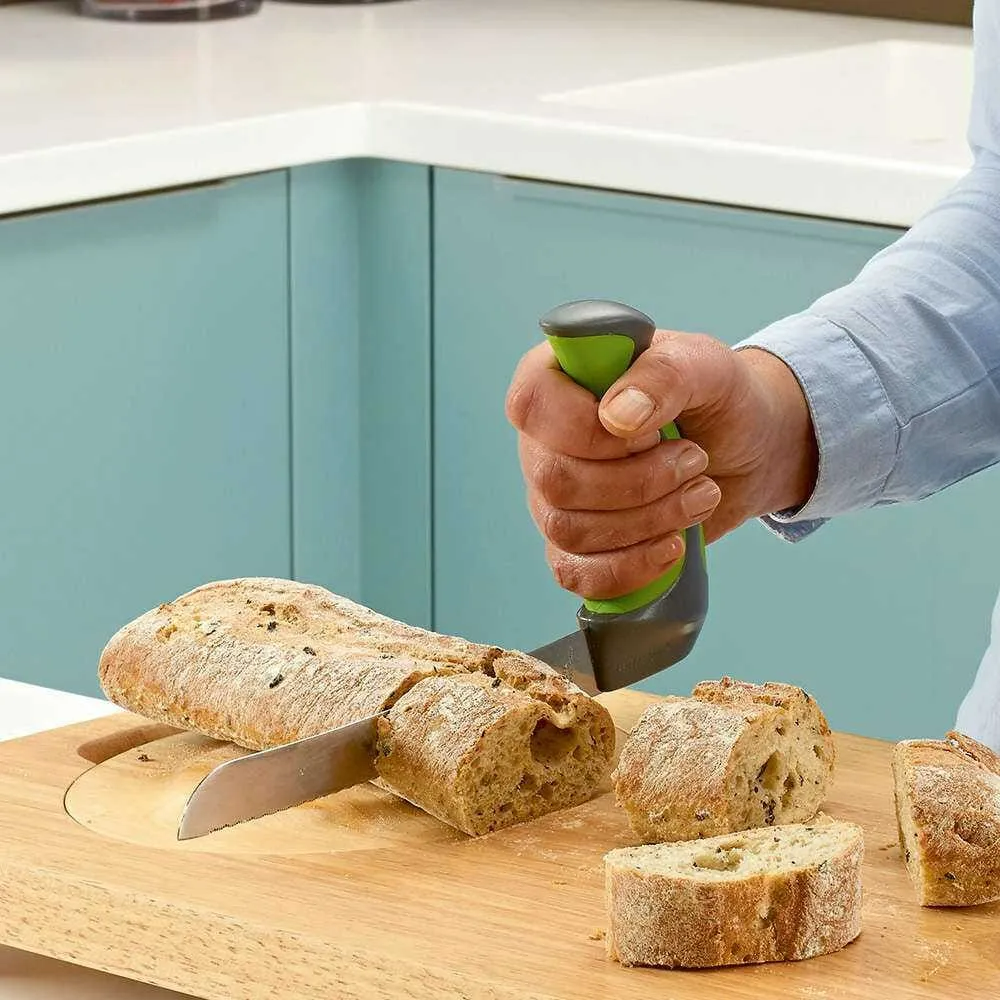Sustainable Tableware for Carers and Patients

Patients with reduced mobility or dementia, along with their carers, need thoughtful solutions that don’t harm the world around them. From the material you choose to the bright colours on the table, the right tableware can make everyday dining safer, healthier, and more enjoyable for everyone involved.
Ornamin is a very interesting company in Germany. It offers well-designed crockery and cutlery for disabled and elderly people (which also makes life easier for carers). But this is also a climate-neutral company that is not just a case of cheap alternatives to conventional tableware.
Finding suitable tableware for people who are older, ill or have motor disabilities is very important, both to prevent spills and protect dignity. Nobody wants to eat and have half their dinner fall on the table or their lap. But this company strives to design the products so well, that they also ‘look conventional’. So no massive big sippy cups etc, but they work as well as such items.
Many patients can’t eat certain foods, due to swallowing difficulties. Read our post on food safety for people and pets. Find more ways to help our carers.
Ensure disabled people and their carers claim benefits. This can not only increase your income, but often gives access to grants to widen doors, install ramps and grab rails, or install heating/lighting controls. There are also Family Fund grants available for children.
This climate-neutral company specialises in good inventions like reusable cups and bowls, along with cups featuring internal cones, to make it easier for disabled people to drink, but more safely and without spills. The plates also have sloped bases, to help keep food on the plate!
Most items are made from bisphenol A-free plastic and designed to last years, being food-safe, dishwasher-safe and (if used) microwave safe. The innovative range (which would also be ideal for hospitals and nursing homes) includes:
- A keep-warm plate, where the sides can be filled with hot water, to avoid having to keep putting food back in the oven or microwave.
- A non-slip board to safely slice fruits, vegetables and bread, with one hand.
- A ‘dementia’ crockery set, designed to promote slow eating. It’s also bright red, to stimulate appetite, also easily seen by people with not-perfect vision.
- A stainless steel cutlery set, easily gripped with a circular spoon to eat from all sides. And a knife designed for safer cutting and heating.
- The mugs enable people with shoulder and neck problems or disabilities to drink, without having to lean their head back. one hand.
You can also choose tableware, based on medical conditions:
- Parkinson’s disease – items are designed to handle hand tremors and muscle stiffness. Along with other issues like swallowing difficulties.
- MS – designed to handle swallowing difficulties, visual disturbances and numbness in the arms and legs.
- Dementia – everything is red to be easily seen and stimulate appetite, using dignified design to encourage good eating and drinking.
- Stroke – items are designed to adapt to the special needs for people, after they have a stroke. Like movement and visual disturbances.
This company goes beyond just providing shatterproof plastic bowls, with each condition having specially-thought out features. Just imagine if the NHS and others invested in such products. It would ensure good nutrition and hydration for patients, and give them far more dignity. And also help exhausted carers too.
Eat Well (invented by the granddaughter of a dementia patient) offers cups with rubber bases (and trays to clip on aprons, to catch dropped food and prevent clothing stains).
Kitchen Aids for Patients & Carers

Easi-Grip knives have stainless steel blades and bright ‘soft feel’ grips that are non-slip, so you don’t have to use your hand as much. The angled handles prevent wrist discomfort, and the knives are less likely to twist, in wet or greasy conditions.
Preventing Dehydration (Dementia)
Many people with dementia forget to drink (and some are even scared of running tap water). To avoid added issues of dehydration, Droplet is an invention used on the NHS and can also be used at home.
This lightweight mug monitors fluid levels with measuring lines, and relatives can record personal messages. The cup then offers an audible reminder (with flashing lights) if someone is not drinking enough.
Ensure kettles have ‘tippers’ to let water pour safely. Built-in water taps are good, but too expensive for most people (around £500).
Why Sustainable Tableware Matters
Traditional plastic plates and cutlery are everywhere, but their single-use nature can lead to higher risk of germs. Each time you grab a fresh plastic fork, there’s another step for someone to handle, unwrap, and toss it after use. This extra movement raises the odds of picking up unwanted bugs or cross-contamination.
Reusable sustainable tableware, made from stainless steel, bamboo, or high-quality washable plastic, goes through a thorough cleaning between uses. There’s less chance for food particles or fingerprints to linger unseen. Fewer hands, less plastic, and less waste means a cleaner, safer mealtime.
Eating should feel comfortable, not like a daily struggle. Many sustainable tableware brands design their dishes with care in mind. Big handles, non-slip bases, and stable sides make a huge difference, especially for those with shaky hands or weak grip.
For someone living with arthritis, tremors, or injury, a wobbly cup or slippery plate is more than an annoyance. It might mean missed meals, spills, or even lost dignity if accidents happen in front of others. Ergonomic utensils – like forks with chunkier handles or cups with fitted lids – make eating easier and safer.
Look for these friendly features:
- Non-slip bottoms
- Chunky, easy-grip handles
- Lightweight but sturdy materials
- Bowls with high sides to help scoop food
Long-term cost savings
It’s tempting to grab a pack of cheap plastic cutlery when time is short, but the bills add up fast. Every disposable cup or plate heads straight to the bin, costing you money over and over. Sustainable tableware is an upfront buy but pays off in the months ahead.
Boosts morale for carers and patients
There’s something special about sitting down to a meal that feels cared for. Eco-friendly tableware often looks and feels better than cheap, flimsy options. When plates are colourful, sturdy, and safe, both patients and carers feel prouder and happier at mealtimes.
Safe cleaning and sanitising routines
Keeping tableware clean can feel like a chore, but a regular routine helps everything stay safe for use. Most sustainable tableware needs careful dish-washing, but you don’t need lots of fancy products or steps.
Avoid scents for pregnancy/nursing and baby/pet food bowls.
For dishwasher-safe items:
- Rinse dishes straight after meals to avoid stuck-on food.
- Group utensils by type in the cutlery basket; point sharp ends down.
- Load plates and bowls with space between them for the water jets to reach all surfaces.
- Use the eco setting where possible to save energy and water.
- Dry using the lowest heat setting to avoid warping items with plastic or silicone parts.
For hand-washing:
- Use warm soapy water with a soft sponge or brush.
- Focus on corners, handles, and any textured areas where crumbs hang about.
- Rinse dishes under running water, checking for soap scum or leftover food.
- Dry fully with a clean towel or let air dry on a rack to avoid damp smells.
Quick care tips:
- Do not leave bamboo or wood soaking in water. Dry after each wash.
- Use a separate sponge for patients’ tableware if illness is a concern.
- Check for chips or cracks during each wash and remove any damaged items.
Smart storage to prevent breakage
- Use bins or baskets to hold matching sets (all cups in one, plates in another).
- Install a dish rack near the sink for air drying and storing lightweight items.
- Put heavy dishes on low shelves to stop accidents if something slips out of your hands.
- Stack bowls inside each other with soft liners or kitchen paper to avoid scratches.
- Set up labelled shelves or drawers using large, clear tags (“Clean Utensils”, “Reusable Plates”, etc).
Sample labelling zones:
- “Daily Use” (for items in constant rotation)
- “Patient-Safe” (for those with non-slip bases or easy-grip handles)
- “Special Meals” (for pureed foods, dietary needs, or festive dishes)






